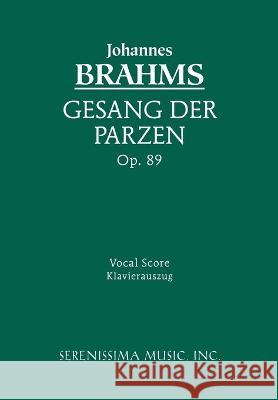Gesang der Parzen, Op.89: Vocal score » książka
Gesang der Parzen, Op.89: Vocal score
ISBN-13: 9781932419498 / Niemiecki / Miękka / 2007 / 26 str.
Brahms enriched the genre of chorus and orchestra with two impressive works from the early 1880s: In 1881, he set a text to Schiller's Nanie (Op. 82, four-part chorus and orchestra) and the next year (1882) he set Goethe's Song of the Fates (Op. 89, six-part chorus and orchestra). Goethe's text for Gesang der Parzen (Song of the Fates), Op. 89 explores the concept of fate as it relates to mankind. The text admonishes us to "Fear the Gods! They hold the power In eternal hands And can use it As they please." Brahms' setting portrays the contrast between the capriciousness of the Fates and the uncertainty of mortals in a variety of ways. Unabridged digitally enhanced reprint of the composer's own vocal score that was issued by Breitkopf and Hartel in the early 20th century.
Brahms enriched the genre of chorus and orchestra with two impressive works from the early 1880s: In 1881, he set a text to Schillers Nanie (Op. 82, four-part chorus and orchestra) and the next year (1882) he set Goethes Song of the Fates (Op. 89, six-part chorus and orchestra). Goethes text for Gesang der Parzen (Song of the Fates), Op. 89 explores the concept of fate as it relates to mankind. The text admonishes us to "Fear the Gods! They hold the power In eternal hands And can use it As they please." Brahms setting portrays the contrast between the capriciousness of the Fates and the uncertainty of mortals in a variety of ways. Unabridged digitally enhanced reprint of the composers own vocal score that was issued by Breitkopf and Hartel in the early 20th century.











